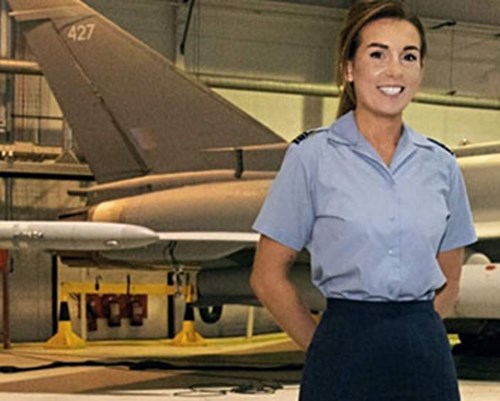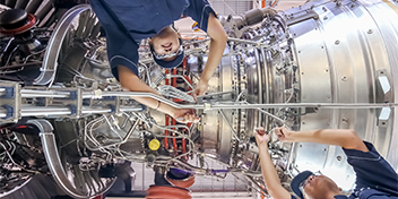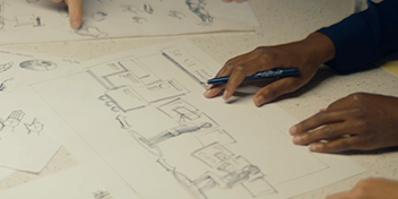What inspired you to become an engineer or pointed you towards an engineering career?
I used to babysit as a young teenager and none of the families had ‘cool’ TV channels, so I was forced to watch science documentaries. Luckily, I ended up obsessed with rockets and all things that fly. As soon as I learnt that aerospace engineers got to do the designing and testing, my mind was made up.
Please describe your role or position within your workplace.
I am the engineering authority for P-8A Poseidon depot maintenance. I work in the delivery team producing the contract for setting up that maintenance programme. My role will be heavily involved in making sure aircraft enter and exit the depot facility on time and in a suitable condition to support the fleet plan and operational requirements.
Can you describe a typical working day?
My current role is a lot more desk-based than previous positions, which has its pros and cons! Most days consist of reviewing documents ahead of contract submission, attending working groups with commercial stakeholders, other engineering representatives, and members of the Continuing Airworthiness Management Organisation (CAMO).
There is a CAMO for every platform that the RAF operate. They are responsible for ensuring that every aircraft of that type is airworthy and maintained in accordance with aviation policy/RAF regulations. I also provide specialist input on depot maintenance, to help other areas of the delivery team or force headquarters with their own planning.
Are there any particular challenges or unusual aspects to your role?
I have not worked in the commercial side of engineering before, so it was a steep learning curve. When ‘authority’ is attached to the job title, the information you provide in briefs and meetings really needs to be accurate. People don’t know that you are new, so you need to be credible from day one and there isn’t much time to get up to speed! Although that can feel like a lot of pressure, it’s also one of the benefits of a Royal Air Force career; you change jobs completely very often, so you get to broaden your portfolio quite early on. This is my fourth tour in less than five years.
What do you find most enjoyable about your job?
In my current role, it’s really refreshing working with civil servants, industry, and contractors. You can get used to the military way of doing things, managing people, and style of communication. It’s been nice to have a different perspective. As an engineering officer, my favourite thing is deploying. Going away is very exciting, often to countries I wouldn’t otherwise be likely to visit. When you are overseas, a lot of decision-making falls on local commanders, and that feels empowering. Looking after the safety and welfare of personnel while away from home is extremely rewarding, and a privilege to be trusted with.
Is there a great professional achievement or high-profile accomplishment that you would like to tell us about?
In 2021, I was invited by the European Space Agency to participate in astronaut selection, having made it to the final five percent of applicants from tens of thousands. I spent three days in Hamburg with 11 other candidates, who stayed in touch afterwards. It was a surreal experience and I hope I can go through the process again in future (and make it to final selection!).
What contributed to your decision to become professionally registered?
I like to drive my career forward, set challenging objectives each year and hold myself accountable. Having specific goals (such as achieving a CEng) helps me to measure my progress. Professional registration is an opportunity to look at your skills and experience objectively to figure out which areas need more focus. The application process itself and being a member also provides you with feedback from other more experienced engineers, which is really helpful.
In what ways has registration benefitted your career?
The registration process introduced me to other Institution of Mechanical Engineer (IMechE) members in the Royal Air Force, who helped me to prepare for my interview. I have been able to network outside my own organisation, and meet engineers who run research groups in areas I am interested in. I have also been able to attend online webinars, conferences, receive online training etc. There are endless opportunities to network and open doors for yourself professionally.
How does your employer benefit from your professional registration?
In my current role, I am industry-facing and work with partner nations such as the United States and Australia. Having professional registration provides another indicator of experience or competence, other than rank, which can help when engaging with engineers at varying levels.
When I work in command roles, being a visible member of the IMechE has encouraged personnel to ask for help with their own registration journeys or help with their career development. This has been particularly rewarding; mentorship is one of the most satisfying aspects of my job.
Is there any advice you would pass on to someone considering professional registration?
If you are unsure of whether you meet the standard for registration or would pass a panel interview, just start writing out portfolio examples anyway. You may surprise yourself with how much you have done and how much experience you do have. Practice answering questions out loud too, it’ll make you more comfortable on the day, even if it feels silly at the time.
Where do you see yourself in your career in five years’ time or what are your future ambitions?
In five years’ time I hope to have completed my second master’s degree and have passed Flight Test Engineer selection and training. I would also like to have another deployment under my belt too (preferably somewhere warm!).
Outside work, is there any activity you enjoy doing in your spare time that relates to engineering? For example, do you participate in mentoring, volunteering, or membership of other engineering groups?
I like taking part in outreach activities, it’s good fun to go to schools to speak about engineering and the amazing places it can take you. All the coolest things I have done would never have happened if I hadn’t become an engineer.
I like to show young students that it’s not all graphs and calculators, sometimes it’s sitting in the back of a helicopter, or travelling to ten new countries in one year, or watching a controlled explosion!









